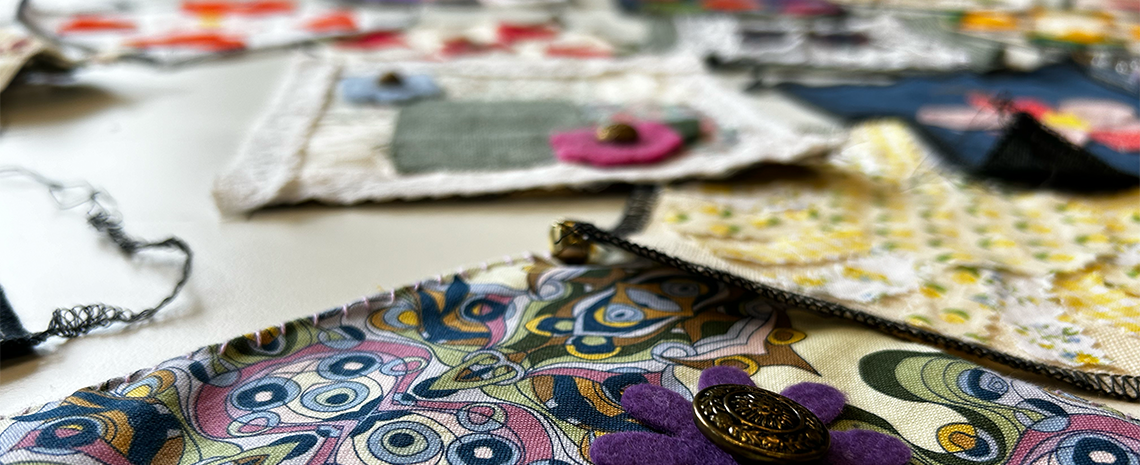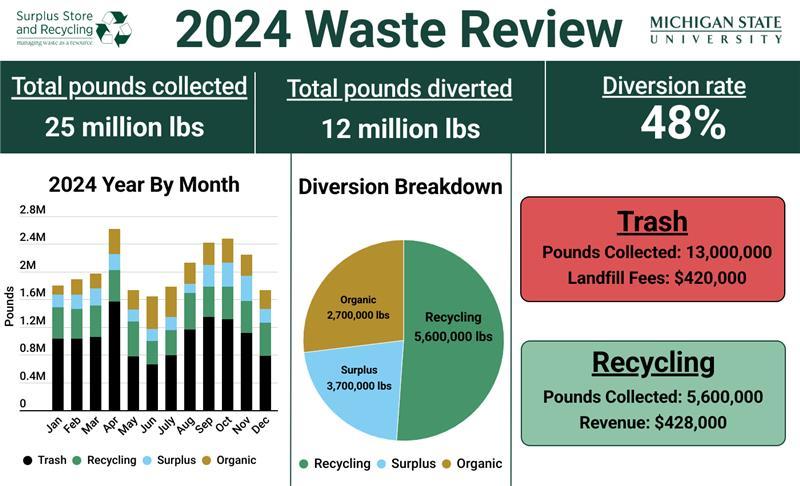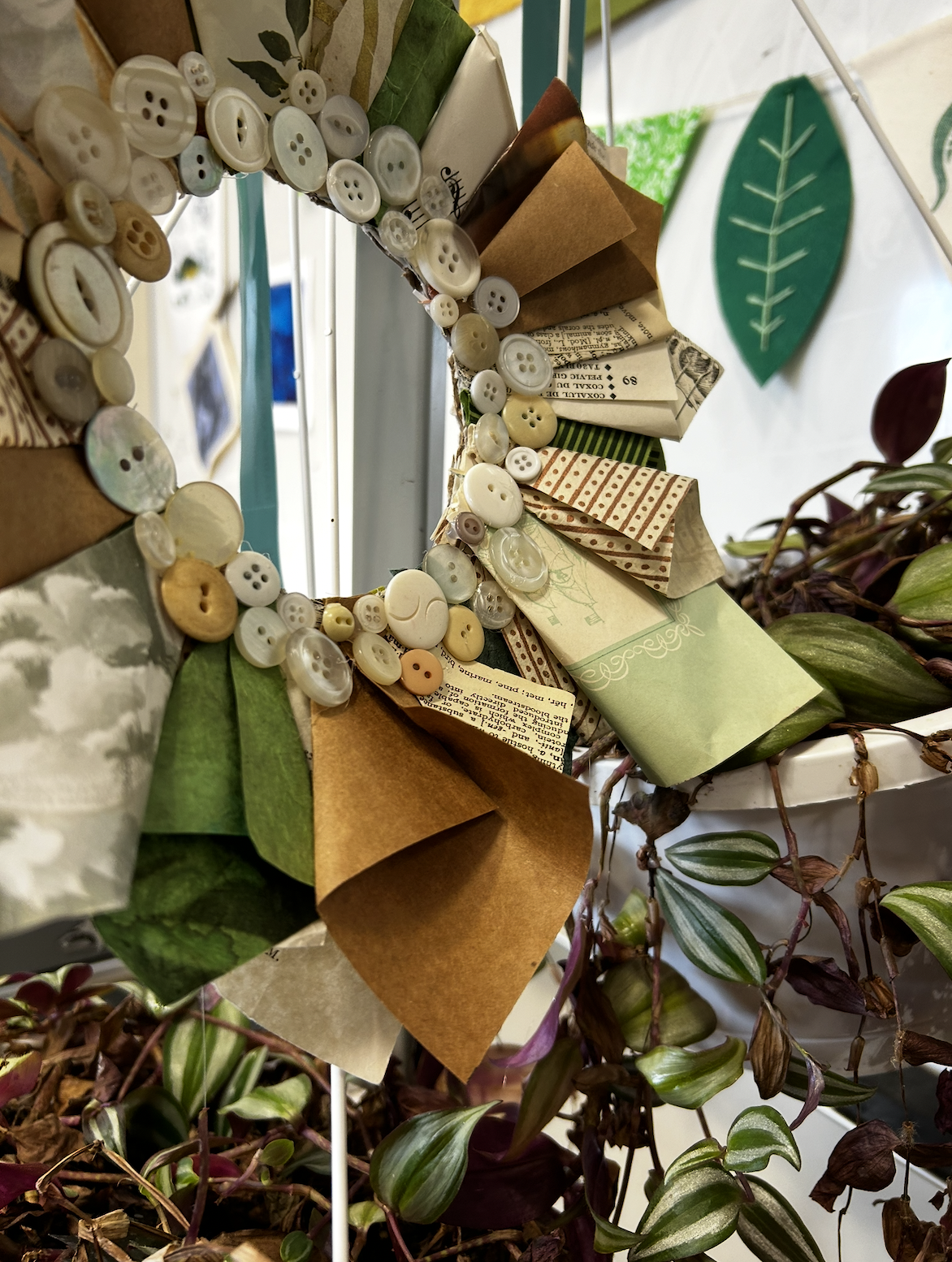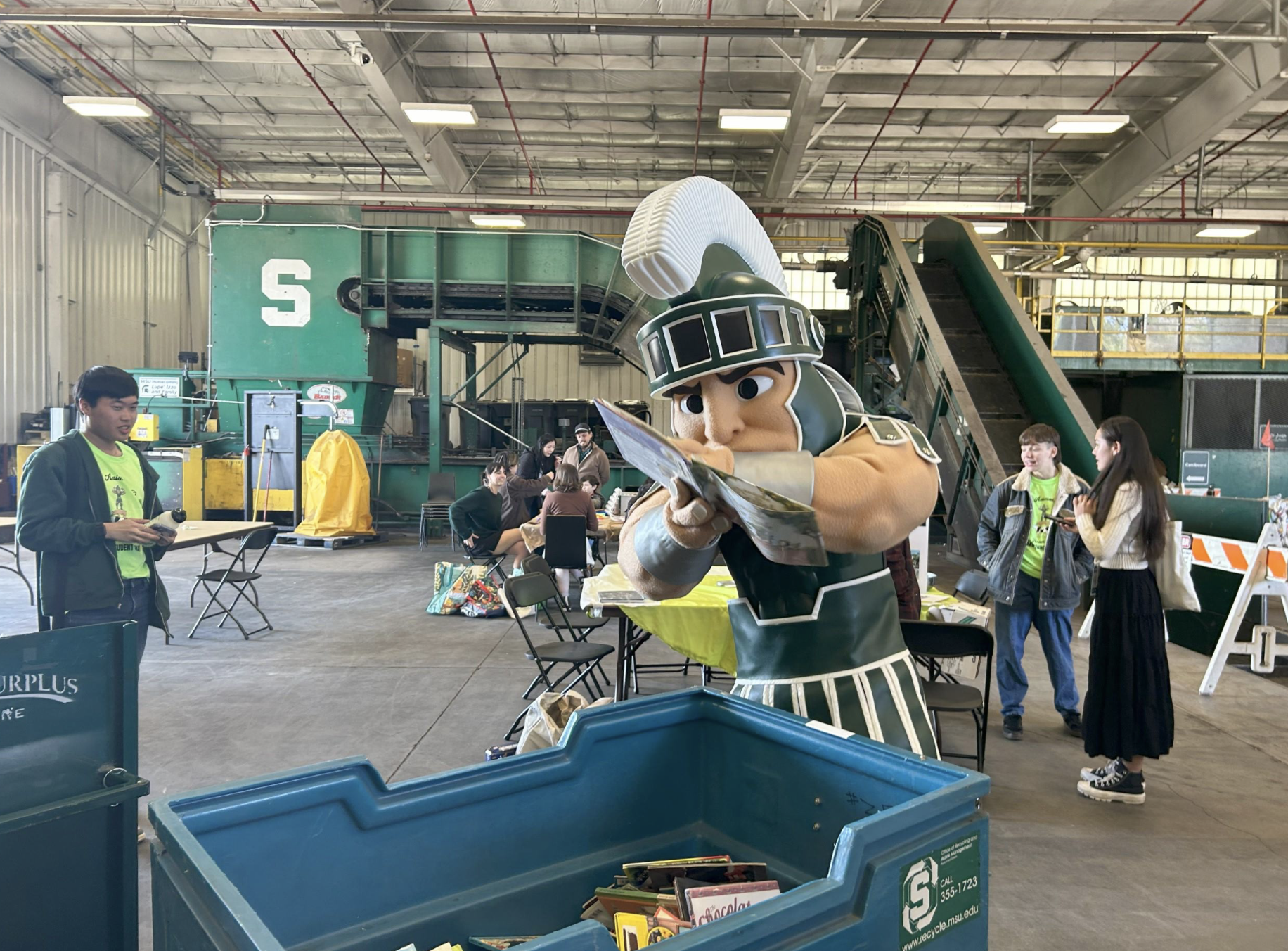SSRC: Turning Waste into a Resource at MSU

Tierra Nelson
April 29, 2025
In the spirit of Earth Day, celebrated on April 22, the MSU Infrastructure Planning and Facilities (IPF) team is highlighting a campus department that champions sustainability year-round—not just for one day. One of those standout programs is the Student Surplus Store and Recycling Center (SSRC), a dynamic operation that transforms MSU’s waste into opportunities for environmental stewardship, education, and community service.
More Than Just Recycling: What is the SSRC?
The MSU Surplus Store & Recycling Center runs MSU’s integrated waste management system and plays a vital role in helping the university reframe waste as a resource. SSRC’s recycling roots stretch back to at least 1972, when three students used a rented U-Haul trailer to recycle paper, cardboard, and plastic, while reuse of campus property dates back decades prior. The 2009 opening of the current facility combined waste reduction efforts under one roof and made space for the department to evolve into a full-scale surplus and reuse operation, managing nearly every stream of discarded material on campus—apart from hazardous waste.
From surplus recovery to construction and demolition recycling, the SSRC’s services are both practical and educational. Its mission is clear: to manage MSU’s waste as a resource while empowering the community to do the same. Through ongoing outreach, the SSRC engages not only MSU students, staff, and faculty but also K–12 schools, local families, and even other universities.
The impact is significant. In 2023 alone, the recycling operation helped MSU avoid nearly $200,000 in landfill costs by diverting recyclables, plus earned over $400,000 by selling that material as feedstock for local processors. Since 1987, waste per student on campus has been reduced by 66%, and total campus waste has dropped by 55%.
To learn more about the SSRC’s history and MSU’s broader recycling journey, visit the SSRC website.

What Happens to Campus “Waste”?
The SSRC processes the vast majority of MSU’s discarded materials. From the bins in Spartan Stadium and residence halls to the academic buildings across campus, items diverted from the landfill are sorted, processed, and either recycled, resold or composted.
Food waste, for example, is separated into two streams: pre-consumer (kitchen scraps, fruits, veggies and coffee grounds) that feed a vermicomposting system, and food waste that’s sent to Hammond Farms for industrial composting. It’s a step beyond basic food recovery—adding education and innovation to the process.
When it comes to physical items, the SSRC accepts everything from electronics and tools to textiles, furniture, and even vehicles. Think Goodwill meets MSU history—where the community can buy everything from used rugs and dishes to benches from Munn Ice Arena or bricks from deconstructed MSU buildings.
Since 2013, the SSRC has diverted over 1.58 million pounds of e-waste, and in 2023, the Surplus Store generated $3.4 million in sales, returning $1.6 million back to MSU departments whose surplus items were sold.
Bringing Sustainability to Life
For Katie Deska, the SSRC’s Education and Upcycle Coordinator for the past six and a half years, the center is more than a warehouse—it’s a classroom and a creative hub.
Deska oversees Spartan Upcycle, the student-centered creative reuse branch of SSRC’s education and outreach program. Using materials collected by SSRC, Spartan Upcycle hosts weekly Student Upcycle Friday events during the fall and spring semesters. Students take part in hands-on reuse projects like ring-making from silverware, printmaking, sewing, lamp building, and more. These activities not only encourage sustainability but help Spartans connect with the value of repairing and reimagining everyday objects.


Recently, the SSRC hosted Earth Bash, a family-friendly event in collaboration with the MSU Science Festival. Visitors explored the SSRC facility, engaged with student groups who offered activities, shopped at the Surplus Store, and learned how composting, recycling and reuse work on campus inspiring them to incorporate recycling in their daily lives.
ScrapFest ReFashion Show, is a creative collaboration between Seams Fabric, ScrapFest organizers Heather and Mike, and SSRC’s Spartan Upcycle. The event will take place on July 11 at 7 p.m. in Old Town Lansing, MI, and offers designers the opportunity to showcase their upcycled apparel and share the inspiration behind their creations. Last year’s show drew 25–30 participants who, with their models, presented their hand-made clothing during the 45-minute showcase. While the event isn’t a competition, it serves as a vibrant celebration of sustainable fashion, with a goal that each piece contains at least 80% recovered or repurposed content—whether it’s something thrifted or a pillowcase turned into a skirt.
Interested in joining the show? Designers can begin working on their pieces during Upcycle Friday Drop-ins at the SSRC on June 6, 13, and 27 from 11 a.m. to 3 p.m. Learn more or sign up at the SSRC website.
Earth Day: A Call to Action
To mark Earth Day, the SSRC emphasizes simple, practical steps that individuals can take to be more eco-conscious.
“Is there one more thing you can do in your everyday life to reduce waste?” Deska asks. “Whether it’s bringing compost bins to a family reunion, switching to reusable water jugs, or bringing spring cleaning items to the surplus store—we can all take one more step.”
The SSRC is also participating in Take Your Child to Work Day, offering youth tours to explain how sustainability works in action, and continuing its partnership with the residence halls to host Pack Up, Pitch In – a collection initiative to prevent items from ending up in the landfill during student move-out season.
“A lot of what we do happens as an afterthought—‘what do I do with this now that my event is over?’” says Deska. “We want to bring sustainability to the forefront of people’s minds and help them be champions in this field.”
As Earth Day reminds us of the importance of caring for the planet, the SSRC reminds us that the choices we make every day—what we toss, reuse, buy, or donate—shape the future of sustainability at MSU and beyond.
Recycling Realities & Common Myths
The SSRC is also working to bust common recycling myths—especially the idea that “nothing actually gets recycled domestically.” In fact, 96% of the materials SSRC collects for recycling remain in-state, supporting local economies and sustainability efforts.
They’re selective in what they ask the community to recycle, choosing only items that have strong market demand and proven recycling potential. “We don’t ask for something unless we know it will become a recycled product,” Deska explains.
However, recycling does face challenges, particularly from evolving packaging technologies that use complex plastics with non-recyclable additives. That’s why reuse, reduction, and conscious consumption remain just as important as recycling.
How to Get Involved
Here’s how you can participate in or support the SSRC’s mission:
- Shop or donate: The Surplus Store is open Fridays from 8 a.m. – 3:30 p.m. You can also shop online 24/7 and opt for curbside pickup.
- Volunteer: Opportunities include helping during student move-out or joining Refashion Upcycle Days in June.
- Stay informed: Visit msurecycling.com or msusurplusstore.com for up-to-date hours, events, and ways to get involved.
